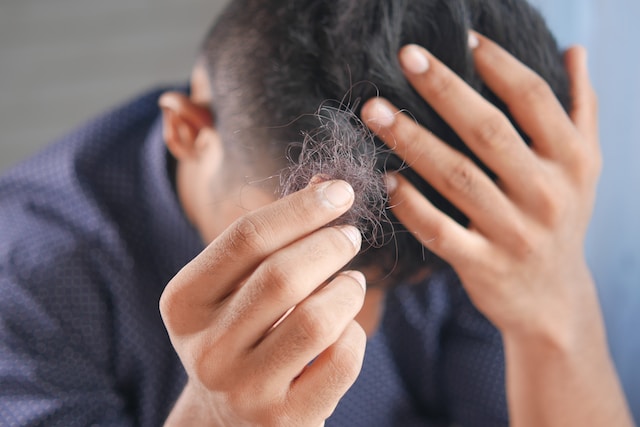The D family of vitamins, which also includes vitamins D1, D2, and D3, includes the fat-soluble vitamin D. Your body naturally produces vitamin D when you are exposed to direct sunshine. You may also get vitamin D from certain foods and supplements to guarantee adequate amounts in your blood.
The body needs nutrients and vitamins to be healthy. A number of issues might develop if there is a vitamin deficit in the body. Worldwide, vitamin D levels are insufficient in about 1 billion people. Approximately 42% of Americans, per a research, lack adequate vitamin D levels. For Hispanic people, this percentage increases to over 63%, and for African American adults, it soars to 82%. Let’s examine the signs of a vitamin D deficiency:
Weight gain

According to one study, there may be a link between low vitamin D levels and weight increase as well as belly fat. Although a lack of vitamin D has been associated with obesity, further study is required to determine the precise relationship between vitamin D and body fat.
Depression

Depression and vitamin D deficiency have been associated, especially in elderly persons, however some research results are conflicting. The results of vitamin D supplementation have varied. However, other research contend that they can lessen the signs and symptoms of depression.
Back pain

Low vitamin D levels can harm bones and result in pain in the back. Through increased calcium absorption in the body, vitamin D supports bone health. Lower levels of vitamin D were linked to more severe pain in a research including 98 patients who had lower back pain. However, a different study found that this association was inconsistent with other, comparable studies.
Hair loss

Low vitamin D levels have been connected to hair loss, notwithstanding the paucity of research. Alopecia areata is an autoimmune disease marked by severe hair loss, and low vitamin D levels in particular have been related to the illness. Lower vitamin D levels were shown to be associated with more severe hair loss in one investigation of patients with this condition. Another study on 48 alopecia patients discovered that using a synthetic vitamin D supplement for 12 weeks significantly accelerated the growth of hair.
Because vitamin D deficiency symptoms might be subtle, it may be tough to detect. Having a vitamin D deficiency is conceivable even if no symptoms are present. Generally speaking, you should see a doctor to have your vitamin D levels checked if you notice any potential symptoms, especially if you have any risk factors.
Also Read | Myths About Dental Health
125 comments
124SDS9742
Outstanding feature
It’s actually a great and useful piece of info. I’m satisfied that you shared this useful info with us. Please stay us up to date like this. Thanks for sharing.
I strongly recommend to avoid this platform. My own encounter with it was nothing but dismay along with suspicion of deceptive behavior. Be extremely cautious, or even better, seek out a more reputable platform to meet your needs.
Enjoyed reading through this, very good stuff, regards. “It is well to remember that the entire universe, with one trifling exception, is composed of others.” by John Andrew Holmes.
I highly advise stay away from this site. My personal experience with it was only disappointment and concerns regarding scamming practices. Be extremely cautious, or alternatively, find a more reputable site to fulfill your requirements.
I¦ve been exploring for a bit for any high-quality articles or weblog posts on this sort of space . Exploring in Yahoo I at last stumbled upon this website. Reading this info So i am satisfied to express that I’ve a very good uncanny feeling I discovered just what I needed. I most undoubtedly will make sure to do not put out of your mind this website and provides it a look regularly.
I strongly recommend stay away from this site. The experience I had with it has been nothing but disappointment and doubts about fraudulent activities. Proceed with extreme caution, or alternatively, seek out an honest site to fulfill your requirements.
Wow that was unusual. I just wrote an extremely long comment but after I clicked submit my comment didn’t appear. Grrrr… well I’m not writing all that over again. Anyhow, just wanted to say wonderful blog!
Attractive section of content. I just stumbled upon your blog and in accession capital to assert that I acquire in fact enjoyed account your blog posts. Anyway I will be subscribing to your augment and even I achievement you access consistently fast.
I highly advise stay away from this platform. My own encounter with it was nothing but frustration along with suspicion of deceptive behavior. Proceed with extreme caution, or better yet, find an honest service to fulfill your requirements.
What is Leanbiome? LeanBiome is a dietary supplement that is formulated with nine critically-researched lean bacteria species.
Really Appreciate this post, can I set it up so I get an update sent in an email whenever you write a new post?
Sight Care is a visual wellness supplement that is currently available in the market. According to the Sight Care makers, it is efficient and effective in supporting your natural vision
I strongly recommend stay away from this site. The experience I had with it was only disappointment as well as doubts about deceptive behavior. Proceed with extreme caution, or better yet, find a more reputable service to meet your needs.
Very interesting topic, appreciate it for putting up.
Your style is so unique compared to many other people. Thank you for publishing when you have the opportunity,Guess I will just make this bookmarked.2
You can certainly see your expertise within the work you write. The sector hopes for more passionate writers like you who are not afraid to mention how they believe. At all times go after your heart. “Until you walk a mile in another man’s moccasins you can’t imagine the smell.” by Robert Byrne.
Regards for helping out, fantastic info .
What Is ZenCortex? ZenCortex is an ear health booster that protects ears from potential damage and improves your hearing health.
After all, what a great site and informative posts, I will upload inbound link – bookmark this web site? Regards, Reader.
I enjoy what you guys tend to be up too. This kind of clever work and coverage! Keep up the awesome works guys I’ve added you guys to blogroll.
Thanks for any other great article. The place else may anybody get that type of information in such an ideal means of writing? I’ve a presentation next week, and I am at the look for such info.
I like this web blog so much, saved to my bookmarks.
Howdy! Would you mind if I share your blog with my twitter group? There’s a lot of people that I think would really enjoy your content. Please let me know. Thanks
Everything is very open and very clear explanation of issues. was truly information. Your website is very useful. Thanks for sharing.
Really clean website , appreciate it for this post.
A powerful share, I just given this onto a colleague who was doing just a little evaluation on this. And he in actual fact bought me breakfast as a result of I found it for him.. smile. So let me reword that: Thnx for the deal with! But yeah Thnkx for spending the time to discuss this, I really feel strongly about it and love studying extra on this topic. If attainable, as you turn into experience, would you mind updating your blog with more particulars? It is highly useful for me. Huge thumb up for this weblog publish!
I really thankful to find this website on bing, just what I was looking for : D too saved to fav.
I truly enjoy studying on this website , it has superb articles.
Hey just wanted to give you a quick heads up. The words in your post seem to be running off the screen in Safari. I’m not sure if this is a format issue or something to do with internet browser compatibility but I thought I’d post to let you know. The design and style look great though! Hope you get the problem solved soon. Cheers
What is Renew? Renew is a dietary supplement designed to support blood flow while also aiming to boost testosterone levels andprovide an explosive energy drive
When I initially commented I clicked the “Notify me when new comments are added” checkbox and now each time a comment is added I get three e-mails with the same comment. Is there any way you can remove people from that service? Appreciate it!
What’s Happening i’m new to this, I stumbled upon this I have found It absolutely helpful and it has helped me out loads. I hope to contribute & aid other users like its helped me. Great job.
Merely a smiling visitant here to share the love (:, btw great design and style.
Hello there, just turned into aware of your blog thru Google, and located that it is truly informative. I am gonna watch out for brussels. I’ll be grateful if you proceed this in future. Lots of folks can be benefited out of your writing. Cheers!
What Is ZenCortex? ZenCortex is a natural supplement that promotes healthy hearing and mental tranquility. It’s crafted from premium-quality natural ingredients, each selected for its ability to combat oxidative stress and enhance the function of your auditory system and overall well-being.
I think that is among the so much vital info for me. And i am glad reading your article. But wanna statement on some normal issues, The web site taste is great, the articles is in point of fact great : D. Just right activity, cheers
I was very pleased to find this web-site.I wanted to thanks for your time for this wonderful read!! I definitely enjoying every little bit of it and I have you bookmarked to check out new stuff you blog post.
Good write-up, I am normal visitor of one?¦s web site, maintain up the nice operate, and It is going to be a regular visitor for a lengthy time.
This web site is really a walk-through for all of the info you wanted about this and didn’t know who to ask. Glimpse here, and you’ll definitely discover it.
Fantastic website. Plenty of helpful information here. I’m sending it to several pals ans also sharing in delicious. And of course, thanks to your effort!
You made some clear points there. I looked on the internet for the topic and found most persons will agree with your website.
Great wordpress blog here.. It’s hard to find quality writing like yours these days. I really appreciate people like you! take care
I like this web blog very much, Its a really nice office to read and obtain information.
Great beat ! I would like to apprentice while you amend your site, how could i subscribe for a blog web site? The account aided me a acceptable deal. I had been a little bit acquainted of this your broadcast offered bright clear concept
As a Newbie, I am permanently browsing online for articles that can benefit me. Thank you
Hiya, I am really glad I have found this info. Today bloggers publish just about gossips and net and this is really annoying. A good website with exciting content, that is what I need. Thanks for keeping this web site, I will be visiting it. Do you do newsletters? Cant find it.
It’s hard to find knowledgeable people on this topic, but you sound like you know what you’re talking about! Thanks
whoah this blog is wonderful i love reading your articles. Keep up the great work! You know, many people are searching around for this information, you can help them greatly.
Does your website have a contact page? I’m having problems locating it but, I’d like to shoot you an e-mail. I’ve got some recommendations for your blog you might be interested in hearing. Either way, great blog and I look forward to seeing it improve over time.
I love it when people come together and share opinions, great blog, keep it up.
I truly appreciate this post. I?¦ve been looking everywhere for this! Thank goodness I found it on Bing. You have made my day! Thank you again
круглосуточная наркологическая помощь москва http://skoraya-narkologicheskaya-pomoshch11.ru .
неотложная наркологическая помощь в москве skoraya-narkologicheskaya-pomoshch12.ru .
сумасшедшие идеи малого бизнеса сумасшедшие идеи малого бизнеса .
Вывести из запоя на дому в Алматы http://fizioterapijakeskic.com/ .
мини бизнес [url=http://biznes-idei13.ru/]мини бизнес[/url] .
Кодировка от алкоголя Кодировка от алкоголя .
поиск объявления по номеру телефона поиск объявления по номеру телефона .
курс доллара к тенге на сегодня курс доллара к тенге на сегодня .
эскорт эскорт .
абстинентный синдром при алкоголизме лечение абстинентный синдром при алкоголизме лечение .
insta story anonymous insta story anonymous .
Everyone loves what you guys are up too. This sort of clever work and exposure! Keep up the fantastic works guys I’ve you guys to blogroll.
I like the valuable info you provide in your articles. I will bookmark your blog and check again here regularly. I’m quite sure I’ll learn plenty of new stuff right here! Best of luck for the next!
маркетплейс аккаунтов соцсетей купить аккаунт
Database of Accounts for Sale Buy accounts
Profitable Account Sales Account marketplace
Purchase Ready-Made Accounts Buy Account
accounts market account trading
purchase ready-made accounts buy pre-made account
purchase ready-made accounts purchase ready-made accounts
verified accounts for sale account market
account market purchase ready-made accounts
website for selling accounts account exchange
purchase ready-made accounts account trading service
account market account market
secure account sales https://marketplace-social-accounts.org/
online account store account trading
profitable account sales account purchase
database of accounts for sale account selling platform
secure account sales account buying platform
guaranteed accounts https://social-accounts-marketplaces.live/
account trading platform https://social-accounts-marketplace.xyz
guaranteed accounts https://buy-accounts.space
account market https://buy-accounts.live
account trading service https://accounts-marketplace.online
sell pre-made account https://social-accounts-marketplace.live
Explore the ranked best online casinos of 2025. Compare bonuses, game selections, and trustworthiness of top platforms for secure and rewarding gameplaycasino activities.
guaranteed accounts https://accounts-marketplace-best.pro
биржа аккаунтов rynok-akkauntov.top
покупка аккаунтов https://kupit-akkaunt.xyz
покупка аккаунтов https://akkaunty-market.live
продать аккаунт kupit-akkaunty-market.xyz
биржа аккаунтов https://akkaunty-dlya-prodazhi.pro
facebook ad accounts for sale https://buy-ad-accounts.click
facebook account buy https://buy-ad-account.top
facebook ad account buy https://buy-ads-account.click/
buy fb ads account https://buy-ads-account.work
buy facebook accounts for advertising https://ad-account-for-sale.top
buy facebook old accounts buy facebook advertising accounts
buy google ads invoice account https://buy-ads-account.top
sell google ads account https://buy-ads-accounts.click
facebook ads account buy https://buy-accounts.click/
google ads account buy sell google ads account
google ads account buy https://buy-ads-agency-account.top
google ads account seller https://sell-ads-account.click
google ads agency account buy https://ads-agency-account-buy.click/
buy facebook business manager buy-verified-business-manager-account.org
verified facebook business manager for sale facebook business manager buy
buy facebook business manager verified business-manager-for-sale.org
buy facebook business manager account https://buy-business-manager-verified.org/
buy facebook business manager https://buy-bm.org
buy tiktok ads account https://buy-tiktok-ads-account.org
buy facebook business manager facebook bm for sale
buy tiktok ad account https://buy-tiktok-ad-account.org
buy tiktok ads accounts https://tiktok-ads-agency-account.org
buy tiktok ads account https://buy-tiktok-business-account.org
buy tiktok business account https://buy-tiktok-ads.org
Explore the ranked best online casinos of 2025. Compare bonuses, game selections, and trustworthiness of top platforms for secure and rewarding gameplaycrypto casino.
Awsome info and right to the point. I am not sure if this is in fact the best place to ask but do you folks have any ideea where to employ some professional writers? Thank you 🙂
Hi there, I found your blog via Google while looking for a related topic, your site came up, it looks good. I have bookmarked it in my google bookmarks.
facebook ad accounts for sale sell accounts website for buying accounts
buying fb accounts account trading platform social media account marketplace